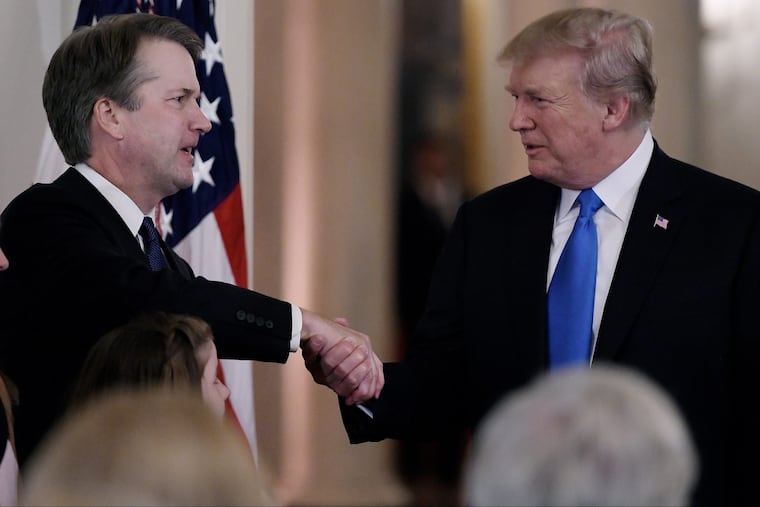What adding Brett Kavanaugh to the Supreme Court could mean for abortion rights and the ACA
While Supreme Court nominee Brett Kavanaugh's position on the Affordable Care Act is less clear than his stance on other high-stakes issues, his conservative track record and support for executive power could threaten the health law, policy analysts said.

Supreme Court nominee Brett Kavanaugh's conservative track record and support for executive power could have a profound impact on health care, policy analysts said Tuesday, the day after President Trump nominated him to replace retiring Justice Anthony M. Kennedy.
Trump has made no secret of his desire to scrap both the Roe v. Wade decision that legalized abortion nationwide, and the Affordable Care Act that has added millions of Americans to the rolls of Medicaid and private insurance. Kavanaugh is considered a more conservative judge than Kennedy, but exactly how he might contribute to the president's goals is being hotly debated by policy experts.
Kavanaugh is a judge on the U.S. Court of Appeals for the District of Columbia Circuit, which in 2011 upheld the ACA, which was being challenged over its requirement that people who can afford it must buy insurance or pay a penalty.
Kavanaugh dissented because he thought the district did not have proper jurisdiction to hear the case.
"I don't think [that dissent] tells you whether he thought the ACA as a whole was good or bad," said Mark Pauly, a health economist at the Wharton School of the University of Pennsylvania.
How the high court might rule on a future challenge to the law — and lawsuits about it are numerous — could affect millions of Americans. Nearly 389,000 people in Pennsylvania and 275,000 in New Jersey bought insurance for 2018 through the health law's marketplace, according to the Kaiser Family Foundation. More than a half-million New Jersey residents gained Medicaid coverage in 2016 as a result of Medicaid expansion, another key provision of the health law, as did 751,000 Pennsylvanians, according to a Kaiser analysis.
Most prominent among the ACA challenges is a Texas suit that seeks to overturn the entire law because Trump's Justice Department has declared it will not defend rules requiring insurers to guarantee coverage to people regardless of their health status or preexisting conditions.
The administration's rules expanding access to association health plans, which are not required to follow ACA benefit standards, and Kentucky's barred work requirement rules for Medicaid recipients are also likely to spur legal challenges, said Dania Palanker, an assistant research professor at the Center on Health Insurance Reforms at Georgetown University's Health Policy Institute.
And though Kavanaugh hasn't been outspoken on the ACA, he has been vocal on another topic — executive authority. That matters, Palanker noted, because some of the pending ACA challenges involve how much power the president has over the law.
Not all the ACA cases will make it to the highest court, but those that do may have a greater chance with Kavanaugh on the bench.
"I don't think there's a whole lot in the tea leaves you can read on any specific thing," Pauly said. "But if I was a betting person and these Republican challenges came to the court, I'd think he'd be more likely to agree with them than throw them out."
Abortion rights advocates also are finding cause for worry — and uncertainty — in Kavanaugh's resume.
Last year, Kavanaugh sharply dissented in Garza v. Hargan, in which the D.C. Circuit ruled in favor of an undocumented teenage girl who sought an abortion. "The majority apparently thinks that the government must allow unlawful immigrant minors to have an immediate abortion on demand," Kavanaugh wrote.
And in a speech last year at the American Enterprise Institute, a conservative think tank, Kavanaugh praised the late Supreme Court Justice William Rehnquist for his dissent in Roe v. Wade and other decisions. "He was my first judicial hero," Kavanaugh said. "For a total of 33 years, William Rehnquist righted the ship of constitutional jurisprudence."
"I don't think it could be any clearer that Kavanaugh disagrees with Roe," said David Cohen, a Drexel University law professor who supports abortion rights. "And now he'll be in a position to overturn it."
Cohen is not reassured by the fact that in 2006, when Kavanaugh was being confirmed to the D.C. Circuit, he told the Senate, "If confirmed… I would follow Roe v. Wade faithfully and fully. That would be binding precedent of the court. It's been decided by the Supreme Court. It's been reaffirmed many times."
Cohen pointed out that "lower courts are bound by Supreme Court precedent no matter how much they may disagree. A Supreme Court justice, in contrast, can vote to overturn precedents. All Supreme Court nominees say they respect precedent, and then they go and do what they want."
Mary Ziegler, a law professor and family planning historian at Florida State University, said she thinks Kavanaugh would favor a more gradual approach, finding that increasingly restrictive laws do not impose an "undue burden" on women — the standard set in the landmark 1992 case that started with challenging Pennsylvania statutes on abortion, Planned Parenthood v. Casey.
"Is he going to chip away at abortion rights? Yes," she said. "Is he going to overturn Roe? I think he's more likely to work within the 'undue burden' framework to impose more restrictions."
Republicans praised Trump's pick as an experienced jurist known for his thoughtfulness on the bench.
"Based on his reputation and resumé, Judge Kavanaugh appears to have the intellect and experience necessary to serve on our nation's highest court," said Sen. Pat Toomey (R,, Pa.) in a statement.
Senate Majority Leader Mitch McConnell (R,, Ky.) in a statement called Kavanaugh a "superb choice" whose judicial record "demonstrates a firm understanding of the role of a judge in our republic: setting aside personal views and political preferences in order to interpret our laws as they are written."